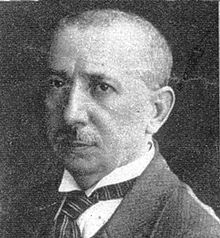Gyula Peidl
| Gyula Peidl | |
|---|---|
 |
|
| Prime Minister of Hungary | |
|
In office 1 August 1919 – 6 August 1919 |
|
| Preceded by | Sándor Garbai |
| Succeeded by | István Friedrich |
|
Head of State of Hungary Acting |
|
|
In office 1 August 1919 – 6 August 1919 |
|
| Preceded by | Sándor Garbai |
| Succeeded by | Archduke Joseph August |
| Personal details | |
| Born |
4 April 1873 Ravazd, Hungary |
| Died | 22 January 1943 (aged 69) Budapest, Hungary |
| Nationality | Hungarian |
| Political party | MSZDP |
| Profession | politician |
Gyula Peidl (4 April 1873 – 22 January 1943) was a Hungarian trade union leader and socialist politician who served briefly as the last prime minister and acting head of state of Hungary in 1919.
Gyula Peidl was born on 4 April 1873 in Ravazd, Győr County.
He headed the printer's union since the beginning of the 20th century.
In 1909 he joined the leadership of the Socialist Party.
During the government of Mihály Károlyi, he was Minister of Labour and Welfare. Opposed to the union of the party with the communists at the beginning of the Hungarian Soviet Republic, he resigned his position in the leadership but maintained his membership in the new unified party.
In July 1919, Romanian troops crossed the Tisza river and marched towards Budapest. On 1 August 1919, Béla Kun ceded power to a moderate government formed only by Social Democrats and controlled by union leaders, and left the country the next day. The parliament of the republic unanimously accepted the change of government in the face of the unpopularity of the Soviet leadership and its defeat, which served to allow the quick occupation of the Romanian capital. President Sándor Garbai summoned Peidl and communicated his request to form a government, as well as a list of ministers, which Peidl reluctantly accepted because of his closeness to the former cabinet.
The government's position was weak, subject to various pressures: opponents in the capital, Horthy's counterrevolutionary National Army, desertion by some smaller military units, or defectors who left the Socialists after having supported the Soviet republic.
The cabinet, which contained four former Kun government commissioners, quickly transformed into Social Democrats, who retained important ministerial portfolios (including Defence and Foreign Affairs). At its first meeting on 2 August 1919, it abolished the Soviet republic and declared again the Hungarian People's Republic; the people's courts were dissolved and political prisoners released. The liberation of the opponents reinforced the counterrevolutionaries. The country worked without a head of the state nor head of government.
...
Wikipedia
